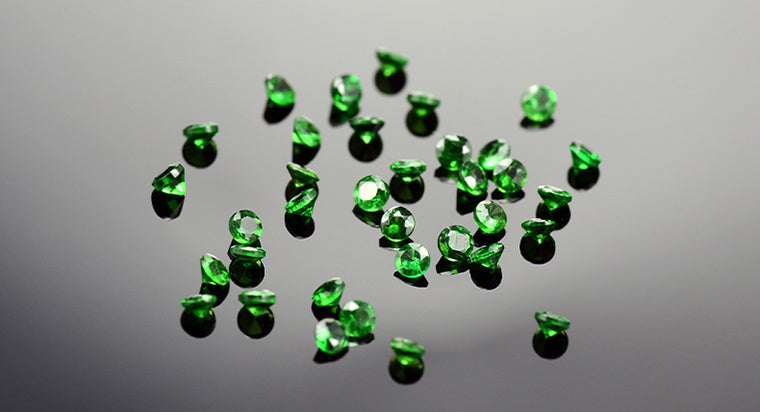About Emeralds

Emeralds have a rich green hue that makes them a prized addition to any jewelry. Natural emeralds are a rare gemstone that are formed and mined around the world.
Emerald Origin & Formation
Emeralds are created one molecule at a time when the right minerals and conditions come together. This is what makes natural emeralds so rare and valuable. Beryl is the mineral that emerald is created from. Beryllium, aluminum, silicon and oxygen come together to create the mineral Beryl. The right temperature and pressure conditions can be the start of forming emerald. Beryl is typically found in metamorphic rocks and in volcanic deposits or in fractures and cracks in large areas of granite rock. The presence of chromium in beryl is what generate the green color. The chromium that is retained in the lattice structure of the beryl absorbs different colors and reflects a vivid green. Trace amounts of iron can also impart a yellowish green color to the emerald. Stones that do not have a richly saturated green color are not considered to be emeralds. When the correct elements are found flowing in veins underground, called hydrothermal veins, emerald can start to form when these cool down. Emerald can also form in large crystaled granite and metamorphic rock.
Emeralds rank at 7.5 to 8 on the Mohs scale meaning that they are softer than diamonds but harder than most other gemstones. Most emeralds have inclusions which are the distinguishing factor between a real and synthetic stone. Oftentimes the inclusions within an emerald are called a garden due to a mossy look.
Emeralds are typically found in Colombia, Madagascar, Canada, Zambia and Brazil among other countries. Emerald can be found in a variety of rock types that include shale and limestone. Colombia is the largest producer of emeralds in the world followed by Zambia.
To improve the appearance of emeralds, the vast majority are treated with heat and oil. These treatments enhance the color, hue and look of the emerald.
FAQs
Are emeralds rare?
Yes, natural emeralds are rare and equally valuable because they are formed in a unique way. They are created one molecule at a time when the right minerals, such as beryllium, aluminum, and silicon, come together under the correct pressure and temperature.
Where are emeralds found?
Emeralds are found in Colombia, Madagascar, Canada, Zambia, and Brazil, with Colombia being the largest producer, followed by Zambia.
Are emeralds treated?
Yes, most emeralds are subjected to heat and oil treatments to enhance their color and minimize the appearance of inclusions.
What gives emerald the green color?
The presence of chromium, iron, and vanadium gives emerald its stunning green hue.
Do all emeralds have inclusions?
Yes, almost all natural emeralds have inclusions, which are considered an intrinsic characteristic of this gem. The flaws are referred to as ‘jardin’ – French for garden, due to their moss-like appearance.









